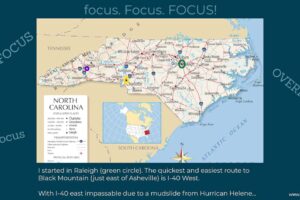
What Stops You from Saying “No”?
How comfortable are you with saying “no”?
- Very – I’m very comfortable saying “no.”
- Depends – My ability to say “no” depends on the situation or person.
- Pretty Uncomfortable – I’m fairly uncomfortable saying “no,” but will if it’s necessary.
- Averse – I really dislike saying “no” and rarely do so.
Keep your answer in mind as I highlight several reasons why it may be difficult for you to say “no” in your professional or personal life.
#1 FEAR
When someone asks you to do something, right away your mind chatter kicks in: “I don’t want to disappoint them” or “I don’t want to let her down.” If it’s something you’ve done in the past or are good at, your internal voice may say, “They’re going to think that I’m dropping the ball.”
Overall, it’s a fear that people will have a negative view of you.
I won’t deny that people might not be thrilled about your “no,” however, you get to design your schedule in ways that work for you.
I also want to remind you that if you consider that fear can be False Evidence Appearing Real, then your mind chatter might be incorrect.
#2 LACK OF CONFIDENCE
You can have the desire to say “no,” yet lack the confidence to do so. Maybe you’re unsure that you “have the right” to say “no.” Or it could be that you aren’t sure of the best way to say “no” confidently.
It’s also possible that you’re ambivalent about whether you want to say “yes” or “no.”
#3 DESIRE TO PLEASE
Are you a people-pleaser?
Many people are. In fact, seeking approval is scientifically proven.
Yet knowing this, doesn’t necessarily make it easier to say “no.” If you’ve spent your life wanting to help others or being deemed the go-to person, it can be scary to consider who you are or what you’ll do if you aren’t busy pleasing others.
Also, feeling the need to be a team-player, including not wanting to “rock the boat,” is part of the desire to please.
#4 LACK OF CLARITY
When you aren’t clear about your values, needs, and boundaries, it’s challenging to say “no.” Why?
Values identify what is important to you. Values are who you want to be as you walk through life.
Needs are what you require for daily living. Three basic needs are food, clothing, and shelter. Beyond those, some of my clients have identified that they need sobriety, order, spirituality, creativity, and more.
Boundaries establish parameters in your schedule. Everyone has one specific threshold: each day only has 24 hours. Beyond that, there are many factors that impact a schedule: job, family responsibilities, adulting duties, etc.
When you’re unclear on your values, your needs, and/or your boundaries, your default answer to most requests will be “yes.”
Now that you know four reasons why it may be hard for you to say “no,” can you identify which one(s) stop you the most? Awareness of the reason(s) you have difficulty saying “no” is the first step towards helping you start using “no” as an answer.
Everyone, not just my coaching clients who have medical diagnoses that impairs their lives, would be able to design a better schedule if they learned the critical life skill of saying “no.”
What makes you hesitant to say “no”? Let me know below.
Saying it out-loud helps decrease its impact.



